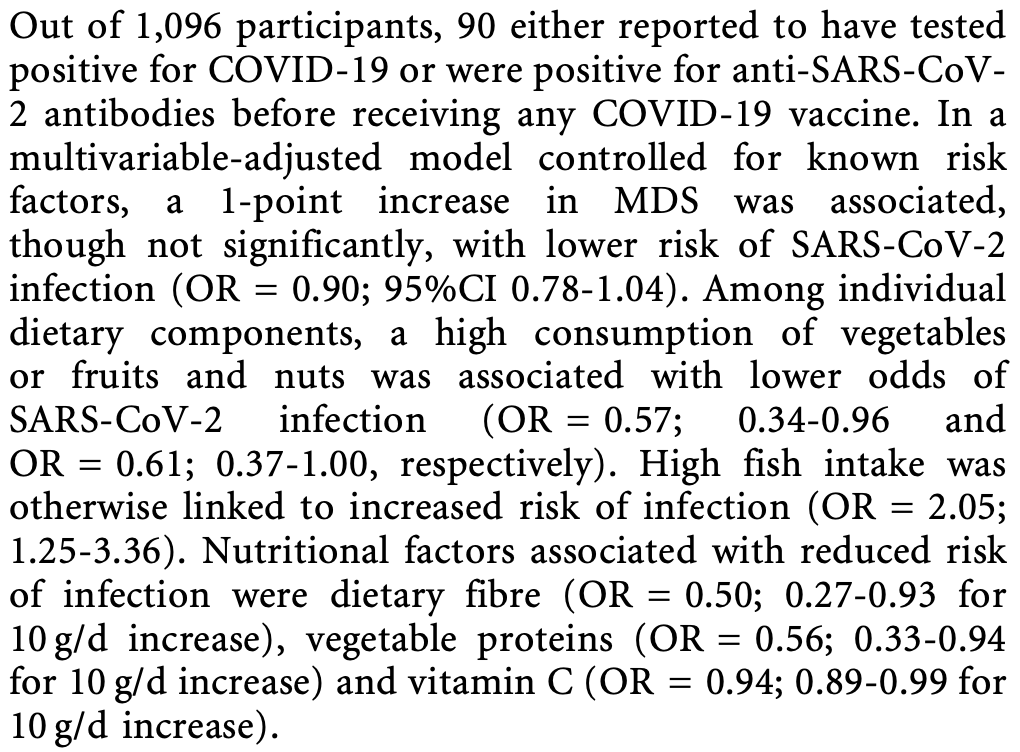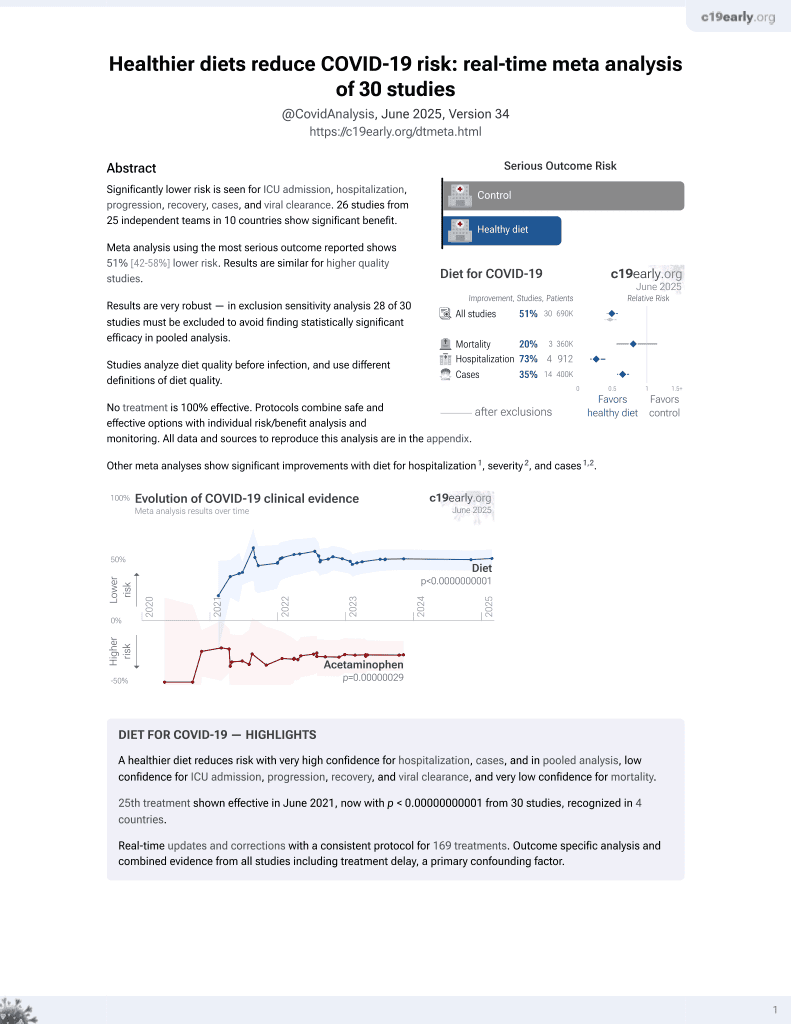
Dietary factors and risk of SARS-CoV-2 infection in the Moli-sani Study Cohort
et al., European Journal of Public Health, doi:10.1093/eurpub/ckac130.235, Oct 2022
Diet for COVID-19
26th treatment shown to reduce risk in
June 2021, now with p < 0.00000000001 from 30 studies, recognized in 4 countries.
No treatment is 100% effective. Protocols
combine treatments.
6,400+ studies for
210+ treatments. c19early.org
|
Retrospective 1,096 participants showing high consumption of vegetables or fruits and nuts associated with lower risk of COVID-19 cases.
Bonaccio et al., 25 Oct 2022, Italy, peer-reviewed, 10 authors.
Contact: v.falcone1@student.unisi.it, marialaura.bonaccio@neuromed.it.
Impact of lockdown on football players' injuries
after deduplication. In the end, 30 articles met the inclusion criteria. Studies originated from 19 different countries of the WHO's European Region, with the most prevalent being France (26.9%, 11/41). The 43.3% of the articles addressed opt-out testing strategies in emergency departments (EDs), 36.6% into prisons, 13.3% in primary care, and 6.6% among people who use drugs. Opt-out default testing was found to be effective in EDs and prisons, whereas only 2 articles tested the efficacy of opt-out strategies for HCV testing in primary care settings.
Conclusions: Opt-out strategies resulted in increased testing rates and higher cost-effectiveness in different settings, especially EDs and prisons. However, to identify individuals with undiagnosed infections, birth cohorts screening in the general population may be needed. Further research is needed to assess the utility of an opt-out default testing strategy in primary care settings.
Key messages: Opt-out strategies resulted in increased testing rates and higher cost-effectiveness in different settings. OpT-out strategies should be implemented in primary care settings to undercover the unknown infections.
DOI record:
{
"DOI": "10.1093/eurpub/ckac130.235",
"ISSN": [
"1101-1262",
"1464-360X"
],
"URL": "http://dx.doi.org/10.1093/eurpub/ckac130.235",
"abstract": "<jats:title>Abstract</jats:title>\n <jats:sec>\n <jats:title>Background</jats:title>\n <jats:p>A healthy diet plays a major role in supporting the immune system which is critical to protect the host from pathogenic organisms. To date, evidence on the relationship between dietary habits and the risk of SARS-CoV-2 infection is still scarce.</jats:p>\n </jats:sec>\n <jats:sec>\n <jats:title>Methods</jats:title>\n <jats:p>Analyses on 1,096 participants from the Moli-sani Study (2005-2010) who were re-examined in 2017-2020, and in January-September 2021. Food intake was assessed in 2017-2020 using a 188-item FFQ. Adherence to Mediterranean diet (MD) was evaluated using the Mediterranean Diet Score (MDS) ranging from 0 to 9. Multivariable logistic regression models were used to estimate odds ratios (OR) and 95% confidence intervals (95%CI) for incident SARS-CoV-2 infection in association with dietary factors.</jats:p>\n </jats:sec>\n <jats:sec>\n <jats:title>Results</jats:title>\n <jats:p>Out of 1,096 participants, 90 either reported to have tested positive for COVID-19 or were positive for anti-SARS-CoV-2 antibodies before receiving any COVID-19 vaccine. In a multivariable-adjusted model controlled for known risk factors, a 1-point increase in MDS was associated, though not significantly, with lower risk of SARS-CoV-2 infection (OR = 0.90; 95%CI 0.78-1.04). Among individual dietary components, a high consumption of vegetables or fruits and nuts was associated with lower odds of SARS-CoV-2 infection (OR = 0.57; 0.34-0.96 and OR = 0.61; 0.37-1.00, respectively). High fish intake was otherwise linked to increased risk of infection (OR = 2.05; 1.25-3.36). Nutritional factors associated with reduced risk of infection were dietary fibre (OR = 0.50; 0.27-0.93 for 10 g/d increase), vegetable proteins (OR = 0.56; 0.33-0.94 for 10 g/d increase) and vitamin C (OR = 0.94; 0.89-0.99 for 10 g/d increase).</jats:p>\n </jats:sec>\n <jats:sec>\n <jats:title>Conclusions</jats:title>\n <jats:p>Adherence to MD was suggestive of a lower risk of SARS-CoV-2 infection. In particular, large amounts of fruit and vegetables were associated with reduced odds of being infected, as well as diets rich in fibre, vegetable proteins and Vitamin C.</jats:p>\n </jats:sec>\n <jats:sec>\n <jats:title>Key messages</jats:title>\n </jats:sec>",
"author": [
{
"affiliation": [
{
"name": "Department of Epidemiology and Prevention, IRCCS NEUROMED , Pozzilli, Italy"
}
],
"family": "Bonaccio",
"given": "M",
"sequence": "first"
},
{
"affiliation": [
{
"name": "Cardiocentro, Clinica Mediterranea , Naples, Italy"
}
],
"family": "Castelnuovo",
"given": "A Di",
"sequence": "additional"
},
{
"affiliation": [
{
"name": "Department of Epidemiology and Prevention, IRCCS NEUROMED , Pozzilli, Italy"
}
],
"family": "Costanzo",
"given": "S",
"sequence": "additional"
},
{
"affiliation": [
{
"name": "Department of Epidemiology and Prevention, IRCCS NEUROMED , Pozzilli, Italy"
}
],
"family": "Persichillo",
"given": "M",
"sequence": "additional"
},
{
"affiliation": [
{
"name": "Department of Epidemiology and Prevention, IRCCS NEUROMED , Pozzilli, Italy"
}
],
"family": "Curtis",
"given": "A De",
"sequence": "additional"
},
{
"affiliation": [
{
"name": "Cardiocentro, Clinica Mediterranea , Naples, Italy"
},
{
"name": "Department of Medicine and Surgery, University of Insubria , Varese, Italy"
}
],
"family": "Gianfagna",
"given": "F",
"sequence": "additional"
},
{
"affiliation": [
{
"name": "Department of Epidemiology and Prevention, IRCCS NEUROMED , Pozzilli, Italy"
}
],
"family": "Donati",
"given": "MB",
"sequence": "additional"
},
{
"affiliation": [
{
"name": "Department of Epidemiology and Prevention, IRCCS NEUROMED , Pozzilli, Italy"
}
],
"family": "de Gaetano",
"given": "G",
"sequence": "additional"
},
{
"affiliation": [
{
"name": "Department of Epidemiology and Prevention, IRCCS NEUROMED , Pozzilli, Italy"
}
],
"family": "Cerletti",
"given": "C",
"sequence": "additional"
},
{
"affiliation": [
{
"name": "Department of Epidemiology and Prevention, IRCCS NEUROMED , Pozzilli, Italy"
},
{
"name": "Department of Medicine and Surgery, University of Insubria , Varese, Italy"
}
],
"family": "Iacoviello",
"given": "L",
"sequence": "additional"
}
],
"container-title": "European Journal of Public Health",
"content-domain": {
"crossmark-restriction": false,
"domain": []
},
"created": {
"date-parts": [
[
2022,
10,
25
]
],
"date-time": "2022-10-25T09:22:26Z",
"timestamp": 1666689746000
},
"deposited": {
"date-parts": [
[
2022,
10,
25
]
],
"date-time": "2022-10-25T09:22:26Z",
"timestamp": 1666689746000
},
"indexed": {
"date-parts": [
[
2022,
10,
26
]
],
"date-time": "2022-10-26T04:54:46Z",
"timestamp": 1666760086052
},
"is-referenced-by-count": 0,
"issue": "Supplement_3",
"issued": {
"date-parts": [
[
2022,
10,
1
]
]
},
"journal-issue": {
"issue": "Supplement_3",
"published-online": {
"date-parts": [
[
2022,
10,
25
]
]
},
"published-print": {
"date-parts": [
[
2022,
10,
21
]
]
}
},
"language": "en",
"license": [
{
"URL": "https://creativecommons.org/licenses/by/4.0/",
"content-version": "vor",
"delay-in-days": 24,
"start": {
"date-parts": [
[
2022,
10,
25
]
],
"date-time": "2022-10-25T00:00:00Z",
"timestamp": 1666656000000
}
}
],
"link": [
{
"URL": "https://academic.oup.com/eurpub/article-pdf/32/Supplement_3/ckac130.235/46587492/ckac130.235.pdf",
"content-type": "application/pdf",
"content-version": "vor",
"intended-application": "syndication"
},
{
"URL": "https://academic.oup.com/eurpub/article-pdf/32/Supplement_3/ckac130.235/46587492/ckac130.235.pdf",
"content-type": "unspecified",
"content-version": "vor",
"intended-application": "similarity-checking"
}
],
"member": "286",
"original-title": [],
"prefix": "10.1093",
"published": {
"date-parts": [
[
2022,
10,
1
]
]
},
"published-online": {
"date-parts": [
[
2022,
10,
25
]
]
},
"published-other": {
"date-parts": [
[
2022,
10,
1
]
]
},
"published-print": {
"date-parts": [
[
2022,
10,
21
]
]
},
"publisher": "Oxford University Press (OUP)",
"reference-count": 0,
"references-count": 0,
"relation": {},
"resource": {
"primary": {
"URL": "https://academic.oup.com/eurpub/article/doi/10.1093/eurpub/ckac130.235/6765454"
}
},
"score": 1,
"short-title": [],
"source": "Crossref",
"subject": [
"Public Health, Environmental and Occupational Health"
],
"subtitle": [],
"title": "Dietary factors and risk of SARS-CoV-2 infection in the Moli-sani Study Cohort",
"type": "journal-article",
"volume": "32"
}
